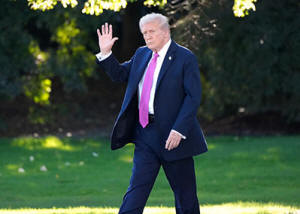|
Trump offers US automakers additional
relief from his tariffs
[October 18, 2025]
By JOSH BOAK
WASHINGTON
(AP) — President Donald Trump is giving domestic automakers additional
relief from tariffs on auto parts, extending what was supposed to have
been a short-term rebate until 2030.
It's part
of a proclamation Trump signed Friday that also made official a 25%
import tax on medium and heavy duty trucks, starting Nov. 1. |

President Donald Trump waves as he walks to board Marine One before
departing from the South Lawn of the White House, Friday, Oct. 17, 2025,
in Washington. (AP Photo/Alex Brandon) |
|
The
action reflected the administration's efforts to use tariffs to
promote American manufacturing while also trying to shield the
auto sector from the higher costs that Trump's import taxes have
created for parts and raw materials.
The special rebate initially announced in April had been set to
be lowered and then expire in 2027. At the time, Trump described
it as short-term aid “during this little transition” with the
expectation that automakers would move production lines back to
the U.S.
The extension and adjustments came after conversations with the
auto industry, senior administration officials said. The goal is
to both expand domestic production and make it more competitive.
The officials insisted on anonymity as a condition for talking
to reporters ahead of Trump signing the proclamation.
The amended action provides a rebate of 3.75% relative to the
sales price of a domestically assembled vehicle. That figure was
reached by putting the 25% import tax on parts that make up 15%
of a vehicle’s sales price. Multiplying those two percentages
together is equal to 3.75%.
The rebate will also now be offered to manufacturers of trucks
and engines, officials said.
Trump had posted on his social media site Oct. 6 about the new
tariffs on imported trucks. Buses will also be tariffed at 10%
as part of the action.
The new tariffs do not apply to imports covered under the
U.S.-Mexico-Canada Agreement on trade. That pact, which went
into effect in 2020, is up for renegotiation next year.
The moves come at a delicate moment for the auto industry as
consumers are enduring sticker shock. According to Kelley Blue
Book, buyers of new autos spent an average of $50,080 in
September, the highest average on record. New auto prices have
increased 3.6% from a year ago.
All contents © copyright 2025 Associated Press. All rights reserved

|
|
|




